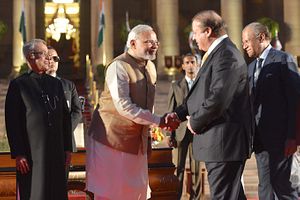The book Spy Chronicles: RAW, ISI and the illusion of Peace, co-authored by two former intelligence chiefs — A.S. Dulat of India’s Research and Analysis Wing (RAW) and Asad Durrani of Pakistan’s Inter- Services Intelligence (ISI) — is unique in many ways. Prior to its publication, it was nigh unthinkable that the former heads of these two intelligence agencies would come together and share their experiences in a book on the difficult and volatile India-Pakistan relationship and the need to end the conflict.
Response to the book has been generally muted but in Pakistan, the military summoned Durrani for violating the military code by revealing certain uncomfortable truths. However, what has been published in the book is in the public domain and the general has not revealed any new facts that could put his country in a bad light.
The spymasters covered many issues, including Kashmir; the involvement of Hafiz Saeed, the chief of Jamat-ud-Dawah, in the 2008 Mumbai attack; and the vexing issue of Kulbhushan Yadav, who was allegedly kidnapped from Iran and brought to Pakistan, where he was charged with espionage and plotting a terror attack. Kulbhushan was tried by a military court and has been handed a death penalty.
The disclosures about the Mumbai attack, four days of carnage which took the lives of 160 people, including foreigners, were nothing new. India has produced evidence of the complicity of Jamat-ud-Dawah, a front organization of the banned Lashkar-e-Taiba, in meticulously planning and carrying out the attack with the help of Pakistan’s ISI. It is also a well-documented fact that the ISI and the army have been waging an asymmetric war with India by supporting terrorist organizations like Lashkar-e-Taiba and Jaish-e-Mohammad to wage proxy war against India.
Recently, in a damning admission in an interview given to a prominent newspaper, former Prime Minister Nawaz Sharif tacitly admitted to Pakistan’s role in the Mumbai attack, although he did not name the terrorist organizations involved. He admitted that India had provided clinching evidence on Lashkar-e-Taiba and other terror outfits responsible for carrying out the attack. He also said that both Vladimir Putin of Russia and Xi Jinping of China had raised the issue with him. In a veiled reference, he blamed the army for the Mumbai attack. However, those statements only raise the question of why Sharif did not submit the dossier on Hafiz to the court, which finally had to let him off because of lack of evidence.
Durrani brought forth an interesting fact in the book. According to him, the cost of prosecuting Mumbai terror attack mastermind and banned Jamat-ud-Dawah head Hafiz Saeed was too great. “If you prosecute Saeed, the first reaction will be: it’s on India’s behalf, you’re hounding him, he’s innocent, etc. The political cost is big, now,” he said.
Durrani’s comment that Sharif had the “acumen of a camel” on international relations is questionable. It was Sharif who reciprocated the gestures of former Indian Prime Minister Atal Bihari Vajpayee, which led to the famous Lahore Declaration in 1999, where both countries agreed to settle all disputes on contentious issues, including Kashmir, through dialogue. Similarly, when Indian Prime Minister Narendra Modi made an impromptu visit to Lahore, it was once again Sharif who expressed his readiness for peace dialogue with India. Durrani has likened Modi to a fox, smart and cunning.
One of the reasons for the state of dysfunctional politics in Pakistan is the role of the army and the ISI, which does want the civilian government to initiate peace efforts with India, as it feels such efforts would diminish its role. Every time an attempt is made by the civilian government it is followed by terror attacks. Modi’s late 2015 visit was followed by the attack on the Indian Air Force base in Pathankot in January 2016.
Earlier, then-General Pervez Musharraf was accused of sabotaging the 1999 Lahore Declaration by attacking Kargil. India gave a bloody nose to Pakistan by recapturing the Hill, a mountain in Drass-Kargil area in the Indian state of Jammu and Kashmir during the 1999 Kargil war. A coterie of generals brought both countries to the brink of a nuclear conflagration.
Retired Lieutenant General Shahid Aziz, in his book Ye Khamoshi Kab Tak (How Long This Silence), attributed the failure at Kargil to Musharraf’s the ill-thought out strategy. The civilian government was kept in the dark about the attack.
Today, however, it appears that there is a growing feeling in Pakistan’s military establishment that the permanent enmity with India has become counterproductive.
In a recent commentary, Kamal Alam, a visiting fellow at the Royal United Services Institute (RUSI), a British think tank, wrote that senior Pakistani officers, “led by Army Chief of Staff General Qamar Javed Bajwa, realize that the way to peace and prosperity is through military cooperation with India.”
The Indian government, which has generally dealt only with the civilian government in Pakistan, should explore bringing the military in as part of the negotiating team so that future Kargil-like situations are avoided.
At a time when we see conflicts in many parts of the world, both of South Asia’s nuclear countries should settle their disputes within a conflict resolution framework. This will not only bring peace and stability in the region, but the people of both countries can gain immensely through people-to-people contacts, revival of cross-border sports exchanges, especially cricket and hockey, and also through trade. The time has come when the leaders of both countries should show statesmanship, forget the bitter past, and works toward a better future.
K. S. Venkatachalam is an independent columnist and political commentator

































